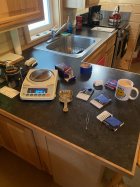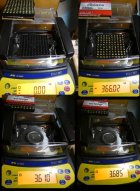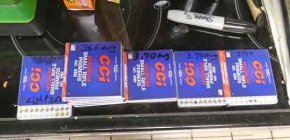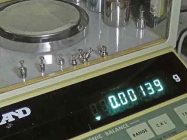I agree. A milligram on a 20 gram/300grain full scale should be easy.
Getting a milligram on a 100 or 200 gram scale requires much better components.
Doable but it will cost you.
For powder charges, sensitivity to small changes, like a kernel of powder is as much of a concern as scale accuracy. I think many folks are misled when calibration happens at a much higher weight such as 50 or 100 grams. That's where you have to rely on the linearity of the scale for small values. Even some of the more expensive scales have a 'linearity' specs of a few counts. Go into the advertised specs of some more expensive scales and calculate all error components at a charge load of 2 or 3 grams.
Another thing folks seldom check out is the ability to CALIBRATE at less than full scale.
The little scale you like can be calibrated (cal mode, press Mode or Tare to change cal weight) at 2 grams, 5 grams, 9 grams , or the full scale of 20grams. Using a couple check weights you can find a range that compensates for linearity error where you plan on using it.
, or the full scale of 20grams. Using a couple check weights you can find a range that compensates for linearity error where you plan on using it.
For example, cal @ 5g, it's seems to be linear to within a count from 1g to 5g. Still drifts a count or so though. For $20 it's a bargain. Easily sensitive enough to SEE one kernel of Varget.
While I like the dual range A&D EJ54-D2 (22g and 54g) it does cost a lot more.
(not as much as some scales though)
You can also pick the cal value. I use 10 gram cal on the 22 gram range.
Another cheapy, not for powder charges, but useful for heavier bullets and brass is shown in the attached pic. 500 grams, 0.01 gram resolution, good to maybe 0.02 gram if you pick a good full scale value to calibrate at.
Check your scale to see if you can PICK the calibration value. Might be able to 'dial out' some error where you want to use it.
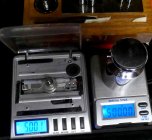
Getting a milligram on a 100 or 200 gram scale requires much better components.
Doable but it will cost you.
For powder charges, sensitivity to small changes, like a kernel of powder is as much of a concern as scale accuracy. I think many folks are misled when calibration happens at a much higher weight such as 50 or 100 grams. That's where you have to rely on the linearity of the scale for small values. Even some of the more expensive scales have a 'linearity' specs of a few counts. Go into the advertised specs of some more expensive scales and calculate all error components at a charge load of 2 or 3 grams.
Another thing folks seldom check out is the ability to CALIBRATE at less than full scale.
The little scale you like can be calibrated (cal mode, press Mode or Tare to change cal weight) at 2 grams, 5 grams, 9 grams
For example, cal @ 5g, it's seems to be linear to within a count from 1g to 5g. Still drifts a count or so though. For $20 it's a bargain. Easily sensitive enough to SEE one kernel of Varget.
While I like the dual range A&D EJ54-D2 (22g and 54g) it does cost a lot more.
(not as much as some scales though)
You can also pick the cal value. I use 10 gram cal on the 22 gram range.
Another cheapy, not for powder charges, but useful for heavier bullets and brass is shown in the attached pic. 500 grams, 0.01 gram resolution, good to maybe 0.02 gram if you pick a good full scale value to calibrate at.
Check your scale to see if you can PICK the calibration value. Might be able to 'dial out' some error where you want to use it.

Last edited:










